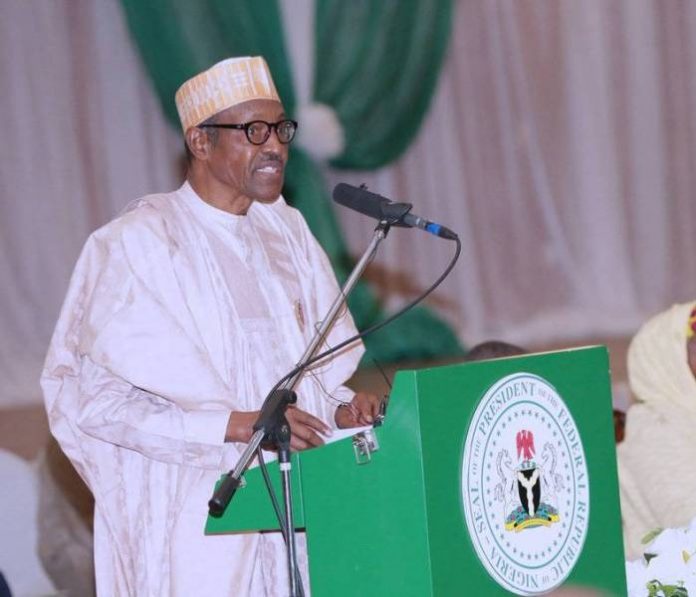Last Monday, November 27, 2017, President Muhammadu Buhari inaugurated a 30-member tripartite National Minimum Wage Committee for the negotiation of a new National Minimum Wage for Nigerian workers. The inauguration held inside the Council Chamber of the Presidential Villa, Abuja, had in attendance governors and senior government officials. Some All Progressives Congress governors, Rochas Okorocha of Imo, Rauf Aregbesola of Osun, Atiku Bagudu of Kebbi and Simon Lalong of Plateau as well as the Peoples Democratic Party’s Nyesom Wike of Rivers and Ibrahim Dankwambo of Gombe, are members of the committee.
The President said the inauguration of the committee followed the recommendation of a technical committee put in place after the increase in the price of petrol in 2016. He also said the current minimum wage being used in the country had already expired. (It was supposed to be reviewed every five years). After the completion of the work of the committee, an executive bill would be sent to the National Assembly “to undergo scrutiny before being passed into law”.
By its tripartite nature, the committee is made up of persons from the public sector, (federal and state governments) and the private sector made up of the Nigerian Employers’ Consultative Association, Manufacturers Association of Nigeria, Nigerian Association of Chambers of Commerce, Industry, Mines and Agriculture and Nigerian Association of Small and Medium Enterprises. The committee has a former Head of Service and Minister of Housing, Ama Pepple, as chairperson, while the Minister of Labour and Employment, Chris Ngige, will serve as deputy chairman. The Chairman, National Salaries, Income and Wages Commission, Richard Egbule, will serve as the secretary of the committee.
Other members of the committee are Udoma Udo-Udoma, Minister, Budget and National Planning; Kemi Adeosun, Minister of Finance; Winifred Oyo-Ita, Head of the Civil Service of the Federation; and Roy Ugo, the Permanent Secretary, General Services, Office of the Secretary to the Government of the Federation. The Director-General of Nigerian Governors’ Forum, Asishana Okauru, will serve as an observer. On the trade union side are the President, Nigeria Labour Congress, Ayuba Wabba, who leads a team comprising Peters Adeyemi, Kiri Mohammed, Amaechi Asugwuni and Peter Ozo-Eson. The Trade Union Congress is led by its President, Bobboi Kaigama, and other members including Sunday Salako and Alade Lawal. The President, Nigerian Union of Petroleum and Natural Gas Workers, Igwe Achese, is also a member. On the employers’ side are Olusegun Oshinowo, Director General, Nigeria Employers’ Consultative Association, as well as Timothy Olawale and Chuma Nwankwo. The Director General, Federation of Construction Industry, Olubunmi Adekoje; Chairman, Kaduna East Branch, Manufacturers’ Association of Nigeria, Ahmed Gobir; and Francis Oluwagbenro also from MAN are members.
It is important to understand how the issue of the national minimum wage came about. Nigeria joined the league of International Labour Organisation member countries that set minimum wage for their workers in 1981. The last time a minimum wage was set before the current one being reviewed was in 2000 with effect from May 1, 2001. Then, the wage was set at a paltry N5,500. It took 10 years to have this benchmark reviewed through a collective bargaining mechanism. The NLC said the union made a demand for wage increase in 2009 after a thorough study of the salaries of political office holders’ pre-and post-consolidation, as well as a careful examination of the minimum annual wage levels in African countries. The study showed that Nigerian workers were among the least remunerated in the world. In the NLC’s estimated cost of meeting basic needs for a representative family done in February 2009, a sum total of N58,500 was arrived at. The NLC however decided to demand a new national minimum wage of N52,200 which the union considered approximate least Minimum Annual Wage levels in African countries, the minimum cost of providing basic needs for the worker and their immediate family and the cost of living data.
Source: today.ng





